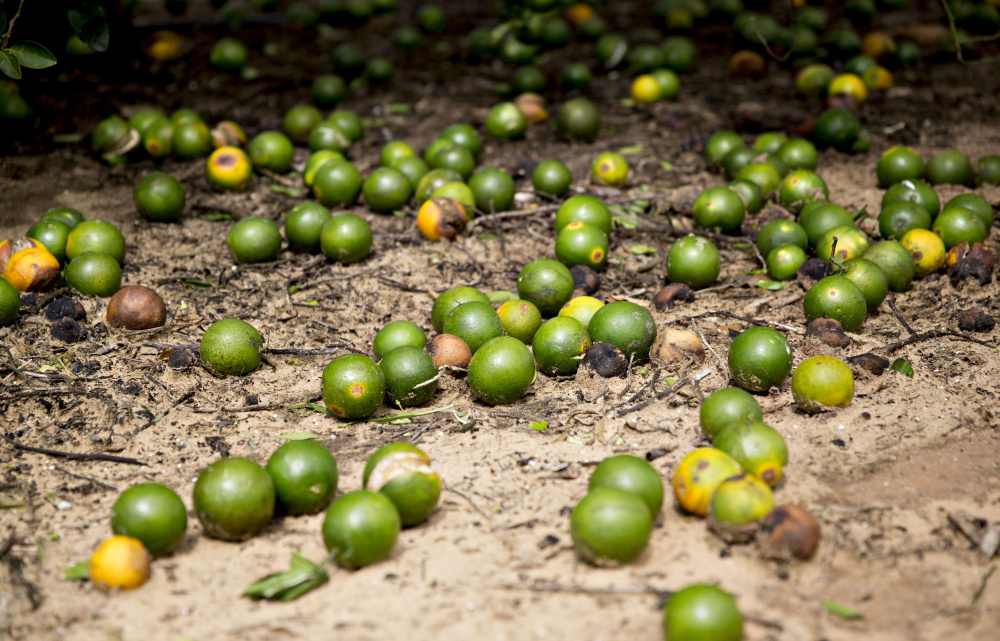Previous storms and diseased citrus groves already were posing problems for the beverage.
Hurricane Irma plundered Florida’s orange belt, leaving a trail of uprooted trees, downed fruit and flooded groves worse than anything growers say they have seen in more than 20 years.
It could even be the knockout blow for a product – orange juice – that has been slipping in popularity among Americans, although the beverage still ranks as the country’s favorite fruit.
The most recent estimates of the widespread damage to Florida’s orange trees put the statewide losses as high as 70 percent. That could lead to orange shortages, price hikes and, for farmers, lost harvests – all on top of a debilitating plant disease called citrus greening and a long-term national decline in orange juice consumption.
“Significant is not the right word,”said Shannon Shepp, the executive director of the growers’ group Florida Department of Citrus, describing the damage to Florida’s orange juice industry. “It’s somewhere between significant and catastrophic.”
It could have implications not only for Florida agriculture, but for the American diet.
Orange juice is big business, and Florida is its epicenter.
According to the Department of Agriculture, the average American drinks 23.74 pounds of orange juice per year – or roughly an ounce each day, more than any other fruit. (By comparison, most Americans eat 10.66 pounds of fresh apples per year, and a measly 2.7 pounds of fresh oranges.)
California and Texas also grow oranges, of course. But Florida is the source of most of the fruit that makes its way into orange juice. Ninety percent of the state’s $1 billion annual harvest is eventually processed into OJ, according to the industry group Florida Citrus Mutual.
That’s no accident. As the food scholar Alissa Hamilton recounts in her book “Squeezed,” America’s love of orange juice was engineered in large part by the Florida citrus industry during the late 1940s – a project aimed at moving excess Florida oranges to other parts of the country.
In recent decades, however, that same industry has been beset by challenges, all of which have made Irma more difficult to bear.
While orange juice still holds the title of America’s most-consumed “fruit,” demand has plummeted from its late ’90s peak – a development the citrus industry blames on changing lifestyles, such as a decline in sit-down breakfasts, and the proliferation of other beverage options. There’s also growing concerns around sugary beverages.
Those are far from the industry’s only struggles. In 2005, a stubborn and debilitating disease called huanglongbing, or citrus greening, was discovered in Florida groves. The disease, which causes bitter and deformed fruits, has since reduced Florida orange and grapefruit revenues by $4.64 billion, according to Jacqueline Burns, the dean for research at the University of Florida Institute of Food and Agriculture Sciences. It’s also believed to have cost the state economy an estimated $1.76 billion in job losses.
As if that weren’t bad enough, the discovery of the disease coincided with one of the worst hurricane seasons Florida had previously seen. Hurricanes Charley, Frances and Jeanne in 2004 slashed orange crops by a third. Growers suffered several more years of near record-low yields.
Now, many fear the damage from Irma could be even worse.
“It’s like nothing I’ve ever seen in my time in this industry – and I’ve been doing this since 1994,” Shepp said. “Growers were already in a bad situation. This was supposed to be their turnaround year. Then Irma happened.”
Shepp cautions that the full extent of Irma’s damage is not yet known, since many groves remain flooded and unripe oranges are still dropping from trees. But after conversations with dozens of growers and state and federal officials, she said estimates vary from as low as 30 percent losses in central Florida to as high as 100 percent in the south of the state.
The Florida Fruit and Vegetable Association is predicting the orange harvest will be down by 70 percent statewide, because of high winds that stripped unripe oranges from branches.
Send questions/comments to the editors.



Success. Please wait for the page to reload. If the page does not reload within 5 seconds, please refresh the page.
Enter your email and password to access comments.
Hi, to comment on stories you must . This profile is in addition to your subscription and website login.
Already have a commenting profile? .
Invalid username/password.
Please check your email to confirm and complete your registration.
Only subscribers are eligible to post comments. Please subscribe or login first for digital access. Here’s why.
Use the form below to reset your password. When you've submitted your account email, we will send an email with a reset code.